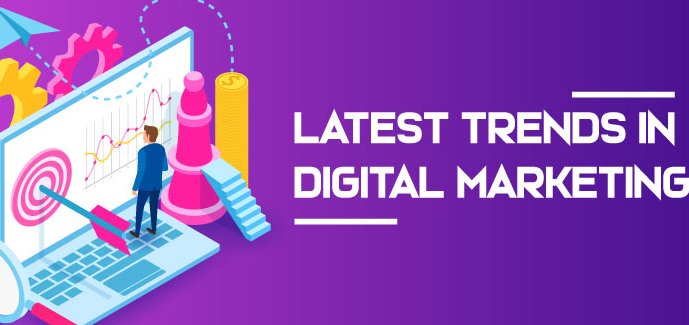In today’s rapidly evolving digital landscape, marketing has undergone a dramatic transformation. The advent of the internet and digital technologies has revolutionized the way businesses reach and engage with their audiences. This article explores the latest marketing trends in the digital age, shedding light on the strategies that drive success in this dynamic era.

The Power of Content Marketing
Content marketing remains a cornerstone of digital marketing strategies. By creating valuable, relevant, and engaging content, businesses can attract and retain their target audience. From blog posts and videos to infographics and podcasts, content marketing takes various forms to capture the imagination of online consumers.
Social Media Dominance
Social media platforms continue to dominate the digital marketing scene. With billions of users on platforms like Facebook, Instagram, Twitter, and LinkedIn, businesses have a vast audience to tap into. Marketers are leveraging these platforms not only for brand promotion but also for engaging directly with customers through personalized content and advertisements.
Video Marketing Takes Center Stage
The rise of video content has been nothing short of phenomenal. Platforms like YouTube and TikTok have exploded in popularity, and businesses are taking advantage of this trend. Short, attention-grabbing videos are becoming a staple in marketing campaigns, helping brands connect with consumers on a more emotional level.
Influencer Marketing Evolves
Influencer marketing is not a new concept, but it continues to evolve. Today, influencers span various niches and have a diverse set of followers. Micro-influencers, in particular, are gaining traction due to their authenticity and highly engaged audiences. Collaborating with influencers can help brands build trust and credibility.
Personalization for Customer Engagement
Personalization has become a crucial element in digital marketing. With access to vast amounts of data, businesses can tailor their messages, product recommendations, and offers to individual customers. Personalization fosters a deeper connection with consumers, leading to increased loyalty and conversions.
The Rise of Chatbots and AI
Artificial intelligence (AI) and chatbots are transforming customer service and support. These technologies can provide instant responses to customer inquiries, improve user experiences, and even assist in sales. Chatbots are available 24/7, ensuring that customers can get assistance whenever they need it.
Search Engine Optimization (SEO) Remains Vital
SEO remains essential for businesses looking to improve their online visibility. As search engines like Google continuously update their algorithms, staying up-to-date with SEO best practices is crucial. Quality content, mobile optimization, and backlink building are just a few aspects of SEO that digital marketers focus on.
E-commerce Boom
The digital age has seen an explosion in e-commerce, accelerated further by the COVID-19 pandemic. E-commerce platforms provide businesses with an opportunity to reach global markets and streamline their sales processes. Many businesses are now embracing omnichannel strategies to meet customers where they are.
Data-Driven Decision-Making
Data is the lifeblood of digital marketing. Marketers have access to an abundance of data, which they can analyze to gain insights into consumer behaviour and preferences.
Ethical and Sustainable Marketing
Consumers are increasingly conscious of ethical and environmental issues. Brands that demonstrate a commitment to sustainability and ethical practices often resonate more with their audience. Ethical marketing is not just about showcasing responsible practices; it’s about integrating these principles into the brand’s identity and mission.
Voice Search Optimization
With the increasing prevalence of voice-activated devices like smartphones and smart speakers, optimizing content for voice search is becoming crucial. Marketers are adapting their SEO strategies to accommodate natural language queries, focusing on long-tail keywords and conversational content.
Interactive Content
Interactive content, such as quizzes, polls, and interactive videos, is gaining traction as it encourages active engagement from users. Moreover, interactive content not only captures attention but also provides valuable insights into user preferences and behaviours.
Social Commerce
Social media platforms are increasingly integrating e-commerce features. Hence, allowing users to shop directly within the apps. Furthermore, social commerce simplifies the purchase process and provides businesses with new avenues to reach and convert customers.
Augmented Reality (AR) and Virtual Reality (VR)
Additionally, businesses are using AR and VR to showcase products in virtual showrooms or to create engaging advertisements and campaigns.
Chat Commerce
Beyond chatbots, chat commerce involves conducting the entire sales process within messaging apps. Customers can browse, inquire about, and purchase products without leaving the messaging platform, making it convenient and seamless.
Conclusion
In conclusion, marketing in the digital age is a dynamic and ever-evolving landscape. To succeed, businesses must adapt to emerging trends, technologies, and consumer behaviours. Whether through content marketing, social media engagement, personalized experiences, or ethical practices, staying ahead of the curve is essential for achieving marketing success in this digital era. Embracing these trends and harnessing the power of digital marketing tools will undoubtedly shape the future of marketing for businesses worldwide.